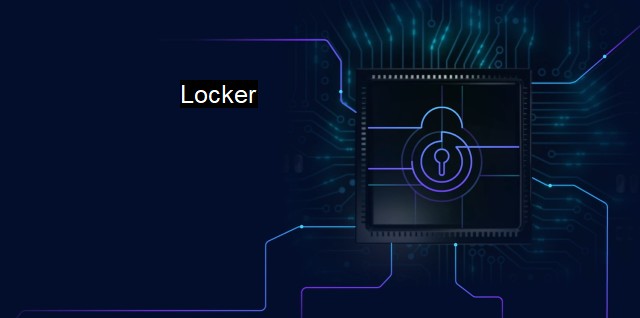What is Locker?
The Menace of Locker Malware: Sophisticated Ransomware Threatening Businesses and Individuals with Encryption and Extortion
Locker, a term commonly used in the domain of cybersecurity and antivirus, refers to a category of malware. Often identified as a subtype of ransomware, Locker represents an ominous threat to individual computer users, corporations, and governments alike. Its essence lies in restricting access to crucial system functions and files, hence the term 'Locker'. Occasionally, these cyber threats also extend to leverage the infected system's resources such-as CPU utilization for their purpose, creating an additional layer of problems for the victims.Locker malware works in an especially curt manner to make data inaccessibility a reality. Once it infects a system - be it a server, a personal computer, or a multi-device network - a henchman for the nefarious orchestrator, it begins transmitting system data back to a central 'control panel'. At this stage, while your computer may continue to function nominally, the Locker malware has sneakily gained backend control, consequently kicking off the process of encrypting all your data.
This encryption of the files and systems can be a devastating blow. Encryption is a beneficial tool. It provides a level of security by transforming readable data into an indecipherable series of characters until it's decrypted using a unique key. when wielded with malicious intent as in case of Locker, the encryption process can instead generate profits for the perpetrators, often leaving the victims helpless.
Once the file encryption is complete, the user loses access to their data. Curtailing all access, Locker masterfully manages to represent itself as an unbreachable wall between the user and their information. Subsequently, a ransom note usually appears, spelling out the perpetrator's demands. The demands typically include large sums of money termed in Bitcoin or alternative untraceable cryptocurrencies. Simultaneously, a countdown clock stimulating an impending pressure also surpasses user interface, culminating the threat rudely hanging over their data's fate.
It's crucial to note that mere regular anti-virus software cannot remedy the Locker invasions. Why? Because often, their detection signature databases are not equipped or updated enough to identify and neutralize this type of threat. Consequently, the defense measures exercised commonly in user systems fail to halt the advance of the Locker malware.
Therefore, the rapid evolution of malware like Locker accentuates the need for advanced and more reliable antivirus programs as well as cybersecurity measures. Such sophisticated antivirus tools follow a multi-layered approach to identify potential malware, are constantly updated, and focus on advanced detection methods. a resolute cyber defense strategy does not rely solely on the antivirus.
A gamut of practices forms part of a balanced cybersecurity strategy that can effectively counter a Locker. First is the continuous computer system update. Regular and timely installation of software patches addresses known security vulnerabilities that malware exploits. regular data backup is critical. Regular backups mean that even in the unfortunate event of a Locker attack, your data is retrievable, offloading the constant dread of data loss. Also, constant vigilance towards suspicious email attachments and dubious downloads can augment the defenses of an individual or organization.
Awareness is the key in the war against Locker and other cybersecurity threats. The importance of recognizing the signals of such intrusions, responding promptly, and not succumbing to the demands of cyber-criminals cannot be stressed enough. After all, paying a ransom is not an assurance of retrieval. The criminal might not give back access and might linger on the system waiting for the next opportunity.
The battle against the Locker malware is undoubtedly a formidable one. it is not impossible. Placing trust in efficient antivirus protections, strategic cybersecurity measures, and deterrent practices will eventually win this battle for cybersecurity.

Locker FAQs
What is a locker in cybersecurity?
A locker in cybersecurity refers to a type of malware that encrypts a victim's files and demands a ransom payment in exchange for the decryption key.How can I prevent my computer from getting infected with a locker virus?
To prevent a locker virus infection, it's important to have a reliable antivirus software installed on your computer, avoid opening suspicious emails and attachments, and regularly back up your important files to an external hard drive or cloud storage.What should I do if my computer is infected with a locker virus?
If your computer is infected with a locker virus, you shouldn't pay the ransom as there is no guarantee that the hackers will provide you with the decryption key. Instead, you should immediately disconnect your computer from the internet, run a full antivirus scan, and contact a cybersecurity professional for assistance.Is it possible to recover my files if they are encrypted by a locker virus?
In some cases, it may be possible to recover your files if they are encrypted by a locker virus using backup copies or by using special decryption tools developed by cybersecurity experts. However, it's important to note that there is no guarantee that your files can be fully recovered.Related Topics
Encryption Password protection Two-factor authentication Malware detection Virus scanning
| | A | | | B | | | C | | | D | | | E | | | F | | | G | | | H | | | I | | | J | | | K | | | L | | | M | |
| | N | | | O | | | P | | | Q | | | R | | | S | | | T | | | U | | | V | | | W | | | X | | | Y | | | Z | |
| | 1 | | | 2 | | | 3 | | | 4 | | | 7 | | | 8 | | |||||||